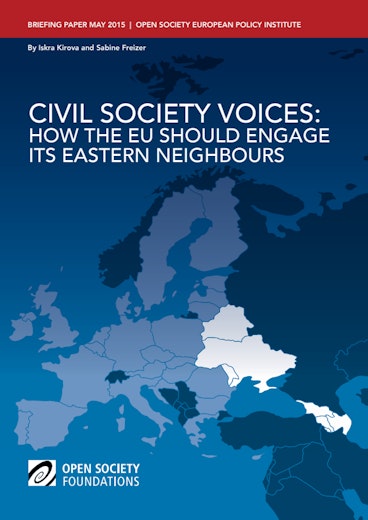The EU’s “eastern neighbourhood” is an increasingly complicated and contested space. The challenge of Russia’s resurgence and regional elites’ resistance to reform are forcing the EU to reevaluate its policies.
With the launch of its Eastern Partnership six years ago, the EU was ready to offer its neighbors to the east—Armenia, Azerbaijan, Belarus, Georgia, Moldova, and Ukraine—integration into the EU market, mobility of people, and close political ties in exchange for rule of law and democratic and economic reforms. Today, it questions whether this policy has secured its strategic interests and political influence.
The Eastern Partnership reinforced domestic constituencies for change in at least three partners—Georgia, Moldova, and Ukraine—that in 2014 signed association agreements. It has not lost the potential to contribute to democratic processes and support reformers in the other three: Armenia, Azerbaijan, and Belarus. The Eastern Partnership remains the EU’s most effective foreign policy instrument to build accountable and stable institutions and states, and uphold the EU’s commitment to its neighbors’ sovereignty and right to make independent foreign policy choices.
This policy paper—the result of extensive discussions with experts and civil society leaders—highlights local concerns and expectations about the EU’s role in the region and its support for stability and democracy. As the EU rethinks its policies in the area, this paper offers recommendations on how to make the Eastern Partnership more effective and relevant to people, societies, and government, and to secure the EU’s interests in an increasingly polarized and unstable region.
Download
-
Civil Society Voices: How the EU Should Engage Its Eastern Neighbours (1016.67 Kb pdf file)
Download the complete 32-page briefing paper.
Read more
Resilience in Moldova
Q&A: Moldova’s Path to a European Future

Moldova has endured the Kremlin’s aggression because it has chosen to leave Russia's sphere of influence and supports Ukraine. The impact of the war on daily life—and why the nation is determined to join the EU.
Rethinking the EU
In an Age of Crisis, an Opportunity to Remake the EU

From climate change to rising authoritarianism, Europe is facing a range of crises that threaten the way we live. The EU must seize the opportunity to reshape how it works and rethink what role it plays in a changing world.
Corporate Responsibility
Q&A: Why (Some) Investors Want More Regulation

As the EU works on rules to protect worker rights and the planet from corporate harm, Open Society’s Jon Jacoby spoke to Anita Dorett, of the Investor Alliance for Human Rights, about how investors are pushing for change.
